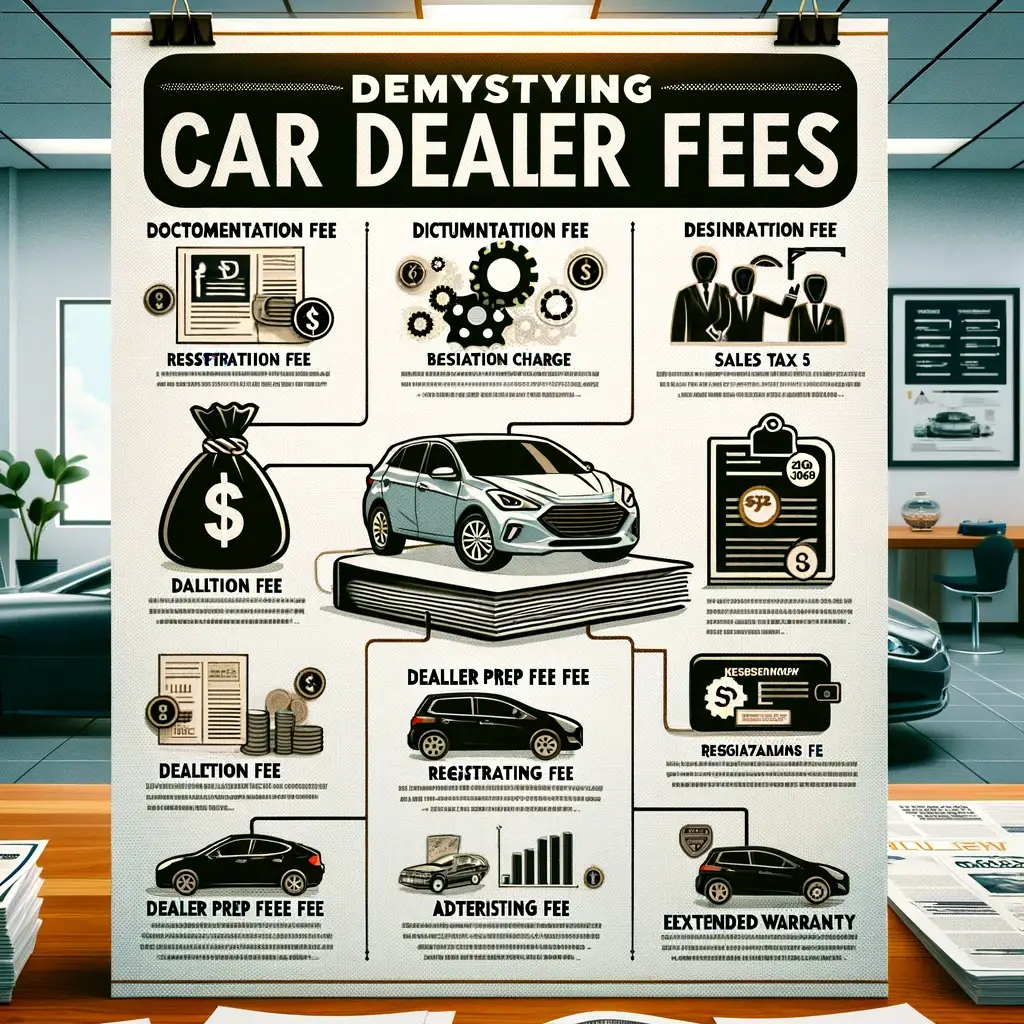In the realm of car buying, the landscape is dotted with pitfalls and hidden costs that can quickly turn a dream purchase into a financial nightmare. One of the most common sources of bewilderment and frustration for car buyers is the slew of fees charged by dealerships. In this article, we will provide you with an in-depth understanding of car dealer fees, how they can impact your purchase, and strategies to navigate them with confidence. Our aim is to equip you with the knowledge and tools needed to make informed decisions and avoid surprises when buying your next vehicle.
I. Introduction
A. Definition of Car Dealer Fees
Car dealer fees, often referred to as additional fees or miscellaneous charges, are extra costs imposed by dealerships during the car buying process. These fees are separate from the vehicle’s purchase price and typically cover various administrative, regulatory, and service-related expenses.
B. Importance of Understanding Dealer Fees
Understanding car dealer fees is crucial because they directly affect the total cost of your car purchase. Failing to grasp the nature and implications of these fees can result in overpaying for your vehicle or feeling deceived by the dealership.
C. Overview of Common Car Dealer Fees
Before delving into the details of individual fees, let’s take a broad look at the most common types of fees you might encounter when buying a car:
- Documentation Fee: This fee covers paperwork and administrative tasks related to your car purchase.
- Sales Tax: Sales tax is a government-imposed fee based on the vehicle’s purchase price.
- Advertising Fee: Dealers charge this fee to cover marketing and promotion expenses.
- Market Adjustment Fee: Applied based on market demand and availability, often seen on high-demand models.
- Predelivery Inspection Fee: Covers inspection and preparation of the vehicle before delivery.
- Electronic Filing Fee: For electronically submitting paperwork to authorities.
- Other Potential Fees: These may include a dealer handling fee, theft prevention fee, VIN etching fee, and other miscellaneous charges. Be sure to inquire about any additional fees when purchasing a car.
II. Common Car Dealer Fees
Now, let’s explore each of these common car dealer fees in detail, shedding light on what they entail, their typical costs, and how they are justified.
Certainly, here’s the extended explanation for the documentation fee:
A. Documentation Fee
1. Explanation of Documentation Fee
The documentation fee, sometimes referred to as a “doc fee,” encompasses the various paperwork and administrative tasks that are an integral part of your car purchase process. This fee is designed to cover the cost associated with processing crucial documents, such as the title, registration, and various forms required to complete the transaction.
2. Typical Range: $50 to $500
The cost of documentation fees can vary significantly from one dealership to another. While some dealerships may charge as low as $50 for this fee, others may impose fees as high as $500. The range primarily depends on the dealership’s policies and practices.
3. Purpose and Justification
Dealerships justify the imposition of documentation fees by pointing to the extensive paperwork and clerical work required during the sale of a vehicle. These tasks involve ensuring that all legal requirements are met, processing the necessary paperwork for the vehicle’s title and registration, and handling various forms and documents essential to the transaction.
However, it’s essential to acknowledge that the transparency of documentation fees has been a matter of ongoing concern among buyers. Some individuals question the need for such high fees, and there have been calls for greater transparency in this area to provide buyers with a clearer understanding of what exactly they are paying for. This issue underscores the importance of informed consumer decision-making when navigating the complexities of car purchasing.
Certainly, here’s the information on sales tax:
B. Sales Tax
1. Explanation of Sales Tax
Sales tax is a government-imposed fee that represents a percentage of the vehicle’s purchase price. Dealerships are responsible for collecting this tax on behalf of the state and local authorities.
2. Calculating Sales Tax
The precise amount of sales tax you’ll pay is contingent on two primary factors:
- The purchase price of the car: Sales tax is calculated as a percentage of the vehicle’s total cost.
- The tax rate in your locality: Different states, and sometimes even cities or municipalities within a state, may have varying tax rates.
3. Variation by State and Local Laws
It’s crucial to understand that sales tax rates and regulations can fluctuate considerably from one state to another and even between different localities within the same state. Consequently, your geographical location plays a pivotal role in determining the final amount of sales tax you’ll be required to pay.
To ensure you have accurate information about sales tax, it’s advisable to consult your local tax authorities or the dealership’s finance department, as they can provide specific details based on your location and the vehicle’s purchase price.
C. Advertising Fee
1. Explanation of Advertising Fee
The advertising fee is a charge imposed by dealerships to cover the costs associated with marketing and promoting their inventory. It encompasses various expenses related to both online and offline advertising efforts. These expenses may include the creation and dissemination of advertisements through TV and radio commercials, online listings on websites and social media, and the production of print materials such as brochures and flyers.
2. Typical Percentage Range
Advertising fees are commonly calculated as a percentage of the vehicle’s price and typically fall within a range of 1% to 3% of the total cost of the car. The specific percentage charged may vary depending on the dealership’s policies and practices.
3. Where Does the Money Go?
Dealerships justify the imposition of advertising fees by emphasizing the importance of marketing and promotion in attracting customers and selling cars. These fees are intended to cover the expenses incurred in advertising the dealership’s inventory and attracting potential buyers.
However, it’s worth noting that some buyers may question the necessity for customers to bear these marketing expenses, especially when purchasing a vehicle. The transparency and clarity surrounding advertising fees remain subjects of scrutiny and discussion within the automotive industry, highlighting the importance of informed decision-making for consumers.
D. Market Adjustment Fee
1. Explanation of Market Adjustment Fee
The market adjustment fee, also known as a “market adjustment addendum,” is a fee that dealerships may add to the vehicle’s price based on market demand and availability. It is often seen on popular or high-demand models.
2. When Is It Applied?
Market adjustment fees are typically applied when a dealership believes it can capitalize on high demand for a specific vehicle, allowing them to charge more than the manufacturer’s suggested retail price (MSRP).
3. Strategies to Handle Market Adjustment Fees
Consumers can negotiate market adjustment fees, but success may vary depending on supply and demand dynamics. Research and patience are key when dealing with this fee.
E. Predelivery Inspection Fee
1. Explanation of Predelivery Inspection Fee
The predelivery inspection fee covers the cost of inspecting and preparing the vehicle for delivery. This includes quality checks, testing, and ensuring the vehicle meets safety standards.
2. Importance of Inspection
This fee is essential for ensuring that the vehicle is in optimal condition when you take possession of it, potentially saving you from unexpected issues down the road.
3. Cost Estimation: Around $100
Predelivery inspection fees typically range from $75 to $150, depending on the dealership and the extent of the inspection.
F. Electronic Filing Fee
1. Explanation of Electronic Filing Fee
The electronic filing fee covers the cost of electronically submitting necessary paperwork and documents to the relevant authorities, such as the DMV or the state.
2. Simplifying Paperwork with Electronic Filing
This fee streamlines the paperwork process, making it more efficient and reducing the risk of errors associated with manual filing.
3. Typical Cost: Around $20
Electronic filing fees are relatively modest, usually hovering around $20.
G. Other Potential Fees
1. Dealer Handling Fee
The dealer handling fee may be charged for various services provided by the dealership, such as vehicle cleaning, fueling, and general preparation for delivery.
2. Theft Prevention Fee
This fee covers the cost of installing anti-theft devices on the vehicle to reduce the risk of theft.
3. VIN Etching Fee
VIN etching is a security measure that involves etching the vehicle’s identification number onto its windows. This fee aims to deter theft.
4. Discussing Less Common Fees
While these fees are less common, it’s essential to inquire about any additional charges when purchasing a car.
III. The Importance of Fee Transparency
A. Why Transparency Matters
Fee transparency is of paramount importance when it comes to car purchases. It plays a vital role in ensuring that consumers are fully informed about the costs associated with buying a vehicle. This transparency is essential for several reasons:
- Building Trust: Transparent pricing and fee disclosure build trust between buyers and dealerships. When consumers have a clear understanding of the fees they are expected to pay, it creates a more positive and trustworthy buying experience.
- Fostering Fair Dealings: Fee transparency fosters fair dealings in the car buying process. It ensures that consumers are not taken by surprise with unexpected or undisclosed fees, leading to more equitable transactions.
B. Tips for Dealership Fee Transparency
To ensure transparency and protect your interests as a consumer, consider the following tips:
- Request an Itemized Fee Breakdown: Always request an itemized fee breakdown from the dealership. This detailed breakdown should provide a clear list of all fees associated with your car purchase, including their names, purposes, and specific costs.
- Carefully Review the Breakdown: Once you receive the itemized fee breakdown, take the time to review it carefully. Scrutinize each fee listed to ensure that it is transparent and justifiable. If any fees appear unreasonable or undisclosed, don’t hesitate to seek clarification from the dealership.
C. Legal Regulations on Fee Disclosure
In some states, specific regulations govern fee disclosure in the automotive industry. These regulations require dealerships to provide transparent and itemized fee information to buyers. To protect your rights as a consumer, it’s essential to familiarize yourself with your state’s laws regarding fee disclosure. This knowledge can empower you to make informed decisions and ensure that dealerships adhere to legal requirements when disclosing fees associated with car purchases.
IV. Frequently Asked Questions (FAQs)
A. What Are Car Dealer Fees?
Car dealer fees, also known as additional fees or miscellaneous charges, are extra costs imposed by dealerships during the car buying process. These fees are separate from the vehicle’s purchase price and typically cover various administrative, regulatory, and service-related expenses.
B. How Much Do Car Dealer Fees Typically Cost?
The cost of car dealer fees can vary widely between dealerships. Common fees, such as documentation fees and sales tax, typically range from $50 to $500, but it’s essential to inquire with the specific dealership for accurate pricing.
C. Can You Negotiate Car Dealer Fees?
Yes, in many cases, car dealer fees are negotiable. Buyers can often discuss these fees with the dealership and attempt to reach a mutually agreeable arrangement. However, the success of negotiations may vary based on the dealership’s policies and market conditions.
D. What Is the Best Approach to Avoiding Excessive Fees?
The best approach to avoiding excessive fees is to be informed and prepared. Research the fees commonly associated with car purchases, request an itemized fee breakdown from the dealership, and be willing to negotiate. Additionally, understanding your rights as a consumer can help you avoid being charged unfairly.
E. Are All Fees Mandatory, or Can You Opt Out?
While some fees, such as sales tax, may be mandatory and non-negotiable, others may be negotiable or optional. It’s essential to review the fee details provided by the dealership and inquire about any optional fees that you may choose to decline.
F. How Can I Compare Fees Across Different Dealerships?
To compare fees across different dealerships, request itemized fee breakdowns from each dealership you are considering. This allows you to compare specific fees and determine which dealership offers the most competitive pricing.
G. What Legal Protections Do Consumers Have Against Hidden Fees?
Consumers have legal protections against hidden fees through various consumer protection laws. These laws require dealerships to provide transparency in fee disclosures. If you suspect hidden fees or unfair practices, you may consider seeking legal advice or contacting consumer protection agencies.
H. Is It Possible to Get a Full Breakdown of Fees Before Purchase?
Yes, it is possible to get a full breakdown of fees before purchase. Dealerships are typically required to provide an itemized fee breakdown upon request. This breakdown should detail all fees associated with the transaction.
I. Are Online Car Purchases Subject to the Same Fees?
Online car purchases may be subject to similar fees as in-person purchases. However, the specific fees and their calculation methods may vary depending on the online dealership’s policies and your location.
J. Can Fees Be Rolled into the Car Loan?
In many cases, fees can be rolled into the car loan, but it’s essential to discuss this option with the dealership and understand how it may affect your loan terms and overall cost.
K. How Can I Be Prepared to Walk Away if Fees Are Unreasonable?
To be prepared to walk away if fees are unreasonable, set a budget before visiting the dealership, research common fees, and be willing to negotiate. If the dealership is unwilling to adjust fees to your satisfaction, consider exploring other dealerships or financing options.
L. What Are the Consequences of Not Paying Dealer Fees?
Failure to pay dealer fees may result in the dealership refusing to complete the transaction or delaying the purchase process. It’s crucial to address any fee-related concerns with the dealership before finalizing the purchase.
M. Are There Any Fees I Should Be Wary of That Aren’t Mentioned?
While we’ve covered common fees, it’s essential to be vigilant and inquire about any additional or less common fees that may not have been explicitly mentioned by the dealership. Always ask for a comprehensive fee breakdown.
N. How Do I Avoid Falling for Fee-Related Scams?
To avoid falling for fee-related scams, be cautious of deals that seem too good to be true, thoroughly review all paperwork, and ensure that fees align with industry standards and regulations. If you suspect a scam, seek advice from reputable sources or authorities
V. Tips for Consumers on Dealing with Car Dealer Fees
A. Research and Preparation
Before heading to the dealership, it’s essential to engage in thorough research and preparation to make an informed car purchase:
- Know Common Fees: Start by familiarizing yourself with the common car dealer fees that you may encounter during the buying process. These often include documentation fees, sales tax, advertising fees, and others. Understanding these fees will enable you to identify and assess them when dealing with the dealership.
- Set a Budget: Determine a clear and realistic budget for your car purchase. This budget should not only include the base price of the vehicle but also account for additional fees and expenses you expect to pay. By setting a budget, you can ensure that you don’t overspend and stay within your financial limits.
- Check Local Regulations: Research and understand the specific regulations and laws governing car dealer fees in your state or locality. Different areas may have varying rules regarding the types of fees that can be charged and any limits or restrictions on their amounts. Being aware of these regulations will empower you to make informed decisions and protect your rights as a consumer.
By conducting thorough research and preparing in advance, you’ll be better equipped to navigate the car buying process, make informed choices, and ensure that you don’t encounter any unexpected surprises when dealing with fees at the dealership.
B. Requesting an Itemized Fee Breakdown
When navigating car dealer fees, it’s crucial to request and review an itemized fee breakdown:
- Ask for Details: Don’t hesitate to approach the dealership and request a detailed breakdown of all fees associated with the purchase. Be proactive in seeking information about each fee, including its name, purpose, and specific cost.
- Review Carefully: Take the time to carefully review the itemized fee breakdown provided by the dealership. Pay close attention to each fee listed, ensuring that they are transparent and justifiable. Look out for any fees that may appear unexpected or unclear.
By requesting and reviewing an itemized fee breakdown, you can gain clarity on the various charges associated with your car purchase. This transparency enables you to make informed decisions and assess whether the fees align with industry standards and regulations.
C. Effective Fee Negotiation Strategies
Negotiating fees is a crucial part of the car buying process:
- Be Polite and Inquisitive: Approach fee negotiations with politeness and curiosity. Ask questions about fees and their justifications, and express your willingness to negotiate.
- Compare Quotes: Obtain quotes and fee breakdowns from multiple dealerships for the same vehicle. Use these quotes as leverage during negotiations to secure a better deal.
- Consider Bundling: In some cases, bundling several fees into one negotiated price can be a more straightforward approach.
D. Staying Informed and Assertive
To ensure a successful car purchase, stay informed and assertive:
- Know Your Rights: Familiarize yourself with your rights as a consumer. Understanding the law can help you navigate fee-related issues.
- Stay Firm but Flexible: While it’s essential to stand your ground when negotiating fees, be open to reasonable compromises. A cooperative approach can lead to mutually beneficial agreements.
- Walk Away if Necessary: If the dealership is unwilling to address your concerns or negotiate fees to your satisfaction, don’t be afraid to walk away. There are often other dealerships and options available.
By following these tips and being proactive in your approach to dealing with car dealer fees, you can navigate the car buying process with confidence and ensure a fair and transparent transaction.
VI. Conclusion
In conclusion, understanding and managing car dealer fees is essential for a successful and cost-effective car buying experience. By familiarizing yourself with the various fees, their justifications, and your rights as a consumer, you can navigate the process with confidence. Remember that transparency is key, and don’t hesitate to ask questions and negotiate when necessary. Armed with this knowledge, you can enjoy your new car without the worry of surprise fees.
With this comprehensive guide and a clear understanding of car dealer fees, you’re well-equipped to make informed decisions and secure the best possible deal when buying your next car. Safe driving and happy car shopping!





